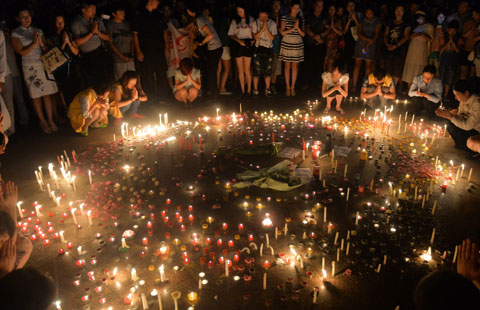Organization of Nanjing Youth Olympics seamless - IOC chief
Updated: 2014-08-26 07:53
(Xinhua)
|
|||||||||||
NANJING -- With four days to go before the 2nd edition of the Youth Olympic Games close in Nanjing, International Olympic Committee President Thomas Bach was full of praise for the event, saying he really enjoys what he has experienced here.
"It is a great experience, just very enjoyable, to meet the athletes, to see the organization here is flawless. We don't have any kind of problems to solve, we can just enjoy the games, enjoy it with the athletes, with the volunteers, with the people of Nanjing," said Bach during an interview with Xinhua on Sunday.
"The organization is seamless. It was a really great job.
"It was a great combination of friendliness and efficiency at the same time. If you have the two together, you are guaranteed to have a successful games," he added.
The IOC chief noted that he was happy to see that the existing facilities have been made the best use of at the first Youth Olympics under his reign.
"I'm very impressed by sustainable ways of the organization. The other day, to give you an example, I was sitting in the BMX stadium, somebody asking me 'Do you recognize these chairs?'. I said 'No, I have no idea'. He said 'You were sitting on the chair of Beijing 2008'. Then I said 'Congratulations, this is a very good idea and approach!' He said 'Do not think that we bought them, we just rented them, if after the games the people from Beijing do not offer us a good price, we will send them back'," said Bach.
While many athletes say they are happy with everything at the Nanjing Youth Olympics, there is also concern over the scale of the Games here and whether a future host will be able to match.
Bach played down the aniexty by insisting that Nanjing should not become a blueprint for future Games.
"The future organizers should think of their own games, should approach it through their way, the future games will hopefully be different from Nanjing, they will present a different idea of youth in a different way, but you can't say that one way is better than the other," he said.
Bach also echoed China's IOC member Yang Yang, who said this week that success here at the Youth Olympics is boosting Beijing's bid for the 2022 Winter Olympics.
"Of course, it can help...Nanjing shows one time more in which excellent way China is organizing a big event, and the friendliness and hospitality of the Chinese people. It is a good showcase for China, and will, of course, support the bid of Beijing," said Bach.
Beijing is competing with Oslo and Alamaty for the 2022 Winter Games. The IOC will select the host city by a secret ballot on July 31, 2015.
A big part of Bach's Agenda 2020, the strategic roadmap for the future of the Olympics, is looking into changes to the rigid sporting structure that currently exists within the Olympic Games. Instead of sticking with just 28 sports, discussions are being held on reducing the number of disciplines for some sports, giving room for new sports to be added to the program.
"There is an agreement. That is to keep the limiation of the number of the athletes. This is important. And also on the other hand, to look very carefully and not to increase the number of the permanent venues. So everything that could be new and should be new should fit into this frame of this two important limitations," said Bach.
"It's not easy. The Olympic program, just like I said in my electoral platform, is like a jigsaw puzzle. It's very complicated. If one piece does not fit, the whole image does not fit," he added.
Today's Top News
Foreign-invested firms losing luster in China
British Ebola patient back to London
Is Shaolin fighting for money?
Donglian's shift from coal to travel pays off
US Ebola patients discharge from hospital
IBM server sales 'never stopped'
Obama declines Ice Bucket Challenge
Hungary to send ammo to Iraq
Hot Topics
Lunar probe , China growth forecasts, Emission rules get tougher, China seen through 'colored lens', International board,
Editor's Picks

|

|

|

|

|

|





